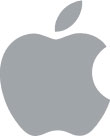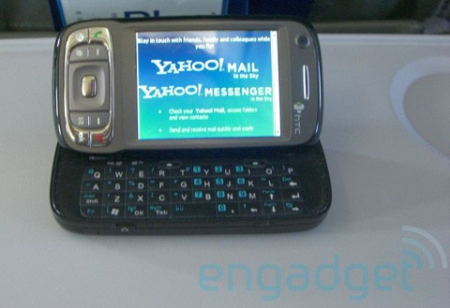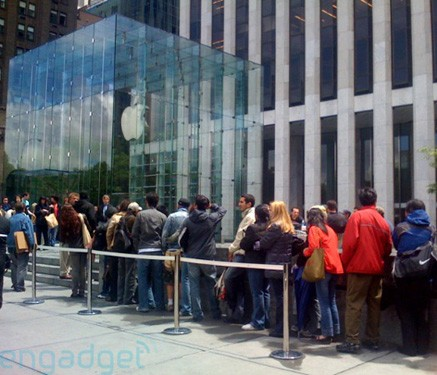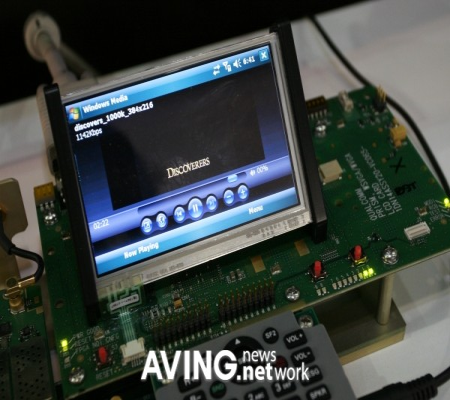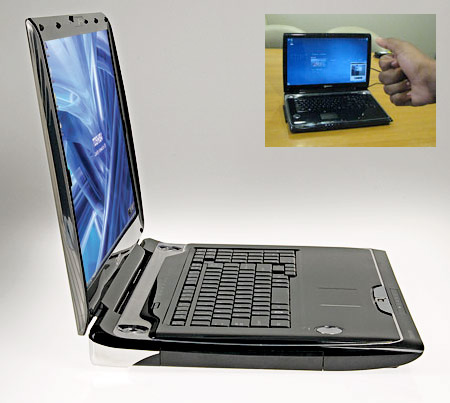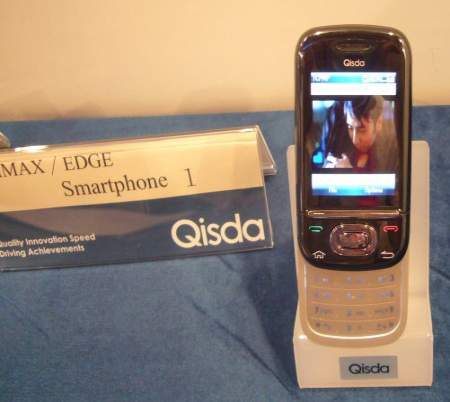Saturday, June 28, 2008
Surprise! Apple to refresh iPod nano / touch, make tons of iPhones
Analysts love to come up with all sorts of conjecture based on history, numbers, and general guesswork. In this case, FBR Research analyst Craig Berger has a few predictions to give us regarding the future of Apple's iPod and iPhone lines. We'll keep them short and sweet here and leave the static mulling to you. First, he expects an updated, lower-priced iPod nano in the near future along with product refreshes for both the iPod classic and touch. That sounds about right, as Apple is almost due for updates of those products anyway. As far as Apple's production rate, he says Apple has increased iPod production around 15 percent and sees Apple shipping 15 million iPhone 3G by the end of the year (he's a big fan of the number "15"). Nothing really surprising here, but if all this pans out, Apple will dig deeper into the smart phone market while tightening its stranglehold on the PMP landscape.
[ Via: Engadget ]
[ Tag: analyst,craig berger,CraigBerger,iphone,ipod ]
Wednesday, June 25, 2008
Nokia buys Symbian, turns software over to Symbian Foundation

Nokia's been in bed with Symbian for many, many years through the development of its S60 platform -- the world's most populous smartphone platform, dont'cha know -- and they're taking that relationship to its endgame today by announcing that they'll be acquiring the remaining shares of Symbian that they don't already own. Here's where it gets interesting, though: rather than taking Symbian's intellectual private for Nokia's own benefit, the goods will be turned over to the Symbian Foundation, a nonprofit whose sole goal will be the advancement of the Symbian platform in its many flavors. Motorola and Sony Ericsson have signed up to contribute UIQ assets, while NTT DoCoMo (which uses Symbian-based wares in a number of its phones) will be donating code as well.
Other Symbian Foundation members include Texas Instruments, Vodafone, Samsung, LG, and AT&T (yep, the same AT&T that currently sells precisely one Symbian-based phone), so things could get interesting. The move clearly seems to be a preemptive strike against Google's Open Handset Alliance, LiMo, and other collaborative efforts forming around the globe with the goal of standardizing smartphone operating systems; the writing was on the wall, and Symbian didn't want to miss the train. Total cash outlay for the move will run Nokia roughly €264 million -- about $410 million in yankee currency.
Update: It's worth noting that the foundation plans to make the entire platform available as open source in the next two years -- "select components" at launch.
Read - Creation of Symbian Foundation
Read - Acquisition of Symbian by Nokia
[ Via: Engadget ]
[ Tag: breaking news,BreakingNews,nokia,symbian ]
Tuesday, June 24, 2008
American Airlines to test in-flight WiFi tomorrow
You heard right, folks. American Airlines is planning to open up the world wide web to passengers on board an unspecified round-trip flight from New York's John F. Kennedy International Airport and Los Angeles. The Gogo service, provided via Aircell, will be free for patrons tomorrow, but will eventually run users $12.95 for flights greater than three hours and $9.95 for trips under said threshold. We're also told that more trials are expected to get going on flights between New York and San Francisco and New York and Miami, though no time frame is given for when the service would escape the beta stage and hit mass implementation. Additionally, the Gogo system is supposed to "prioritize the flow of data so that passengers downloading movies or large documents won't prevent other passengers from getting their email," so don't expect to use that excuse for not sending in those Q2 close reports.
[ Via: Jaunted ]
[ Tag: aircell,aircraft,airline,airplane,american airlines,AmericanAirlines,gogo,in-flight,in-flight wifi,In-flightWifi,internet,plane,wifi ]
iPhone and iPhone 3G comparison shot arrives, only one can emerge victorious
Our money is on the one with more G's, but that's just us. The folks at iLounge managed to nab a comparison shot of the original iPhone next to its 3G successor, and while the differences aren't anything you couldn't have guessed, it's still nice to see the two in the flesh -- at least we think they're in the flesh, this could be just a shot of the iPhone 3G's rear case, which has been floating around iLounge of late.
[ Via: Engadget ]
[ Tag: apple,comparison,in the wild,InTheWild,iphone,iphone 3g,Iphone3g ]
Apple's iPhone 3G to go on sale at 8:00AM on July 11th?
Don't take a vacation day just yet or anything, but early word has it that Apple's iPhone 3G will actually go on sale at 8:00AM (local time, most likely) on July 11th. If you'll recall (how could you forget, right?), the original iPhone didn't go on sale until 6:00PM on launch day, but considering that the whole checkout process will likely be a fair bit more involved this go 'round, we'd say it's a smart move to get the line rolling early.
[ Via: Engadget ]
[ Tag: 3g iphone,3gIphone,apple,iphone,iphone 3g,Iphone3g,launch,launch date,launch time,LaunchDate,LaunchTime,rumor ]
Switched On: The iPhone's iFunnel
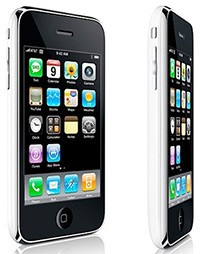
The first iPhone arrived at a time that suggested Apple needed to protect its iPod franchise -- but Apple delivered something that was much more than an MP3 player that could make phone calls. You probably won't be editing any iMovies on it for some time, but in the iPhone Apple has essentially delivered Macintosh 2.0. It's portable. It's affordable. It's connected. And it runs OS X, complete with its own breakthrough pointing device, your finger. Whereas the first Mac came with productivity applications MacWrite and MacPaint, the iPhone came with applications for Web surfing, e-mail, and consuming media, the evolution of what much personal computing has become.
Furthermore, Apple has shown that it has learned from mistakes it made with the first Mac. Whereas early monochrome Macs were a tough sell for game developers, Apple has highlighted games as some of the most impressive early third-party applications for the iPhone and iPod touch. And whereas Apple was notorious for keeping Mac prices high for many years, the next-generation iPhone takes advantage of carrier subsidies for an out-of-pocket price of $200 in the US (and even less or free in some countries). Despite the many changes that have transformed the software industry since 1984, the iPhone, along with its SDK, development tools and app store, have the potential to bring the work of OS X developers to millions of people who don't own Macs -- that is, if Apple lets them.
As the sole distributor of iPhone applications, Apple has absolute authority on what programs are made available to customers, and can refuse distribution of any application at will. It is the iFunnel, imposing more control than is exerted over most smartphones -- or even many feature phones that can access Java applications -- that are marketed off of the carriers' deck. Apple has already outlined some kinds of applications that it will disallow: programs that feature pornography, compromise privacy, hog bandwidth or device resources, or are illegal or malicious. However, there seem to be many applications that don't fall into these categories, applications that vendors say are ready to go, but which Apple has not yet approved, such as Adobe's Flash or TomTom's navigation software.
As one product manager at a large, longtime cross-platform developer that has created an innovative and free iPhone application recently put it, anyone can create anything using the iPhone emulator. The trick is getting it onto the device. The manager said that his company had the scale and historic relationship with Apple to instill confidence that it could get its app approved. He noted Apple has been overwhelmed with submissions, though, and wants to maintain a good user experience at launch, even if that means featuring a small portion of applications that are ready to go.
Operating on a cellular network certainly complicates software development in a way that the gung-ho evangelists of the Mac's early days didn't need to consider. And by scrutinizing applications for quality and polish, Apple can keep the iPhone user experience more stable and consistent than that of early Macs. But, as Steve Jobs admitted after Apple first locked out all alll third-party native iPhone applications, Apple is a platform company and ultimately its value in being in the cell phone market ties back to that heritage.
Being too restrictive on which applications are allowed for the iPhone won't right another wrong of the first Mac's development. It will stifle a platform that Apple has clearly committed to with an SDK. For the benefit of iPhone and iPod touch users, OS X developers, and ultimately Apple itself, the iFunnel should let quality programs flow freely.
[ Via: Engadget ]
[ Tag: Apple,featured,features,iPhone,SDK,switched on,switchedon ]
Saturday, June 21, 2008
Knight Rider GPS With KITT's Voice! [GPS]
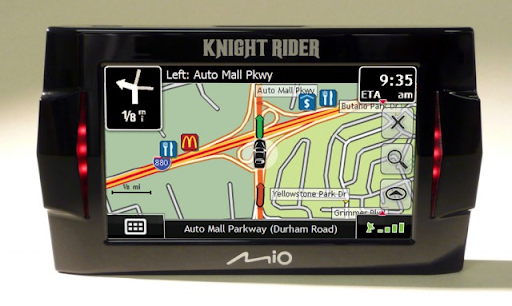
I already have a GPS unit but I'll be dammed if I'm not throwing it out because the guys at Mio have come up with a Knight Rider branded GPS unit with voice prompts by the one and only
[ Via: Gizmodo, The Gadget Blog ]
[ Tag: ]
Dash Express now officially $300
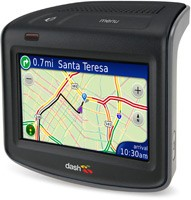
Looks like that sale at Amazon's turned into a full blown price cut -- Dash has officially lowered the price on the Dash Express from $400 to $300 (not including service, of course). Of course, this can be interpreted one of two ways: they're selling so well that economies of scale have kicked in, and everyone saves money buying the GPS -- or, the fresh-faced company's sole product isn't doing very well in the marketplace, leading to this second price drop so far. We're hope it's not the latter though, we're definitely stoked to see where else Dash can take us.
Update: Dash let us know that sales are meeting expectations, and they're capitalizing on the big uptick in new buyers during the last $300 price promotion. Good to know!
Update 2: Bonus! People who bought on or before May 31st are getting three free months of service. Thanks, Justin.
[ Via: Engadget ]
[ Tag: dash,dash express,DashExpress,price drop,PriceDrop ]
KDDi rolls out Toshiba Sportio W62T cellphone
We caught a brief glimpse of Toshiba's Sportio W62T when KDDi announced its vast summer 2008 lineup of phones, but the Japanese carrier is just now giving the handset its proper due with an official launch. As the rather unfortunate name suggests, this one's intended to help you out in your various athletic endeavors, with it packing an accelerometer and built-in GPS to keep track of how many steps you take and how far you've gone, as well as how many calories you've burned. As if that wasn't enough, you'll also apparently be able to "compose music" by jogging along to special tracks. Otherwise, you can expect a 2.2-inch 240 x 320 display, a built-in 1seg TV tuner, a 2-megapixel camera, and built-in Bluetooth -- no word on a price just yet though.
[ Via: Pocket-lint ]
[ Tag: kddi,sportio,toshiba,w62tsportio w62t,W62tsportioW62t ]
Mio's Knight Rider GPS speaks with the voice of KITT we're in love
Move over, Dash Express. Take a seat, Garmin and Tom Tom. As of right now there's only one GPS unit worth buying, and it's this trick Knight Rider unit from Mio that issues directions in the voice of KITT. Yep,
[ Via: Autoblog ]
[ Tag: kitt,knight rider,knight rider pnd,KnightRider,KnightRiderPnd,mio,pnd,william daniels,WilliamDaniels ]
Samsung's Snapdragon super-MID just days away?
While we haven't found an official press release on the subject, AVING is reporting a June 2008 retail release of a Samsung Snapdragon MID. This according to a Qualcomm official. It's unclear to what extent Sammy's device will make good on Snapdragon's list of "supported" features like 12 megapixel camera, GPS, HD video playback, WiFi, Bluetooth, all day battery life, digital broadcast television (MediaFLO, DVB-H, and/or USDB-T) and dual-mode EV-DO Rev. B and UMTS/HSDPA/HSUPA riding atop a 1GHz processor and Qualcomm's 600MHz always-on DSP. All we've got is this picture of an engineering prototype (actually based on Snapdragon this time) on display right now at the World IT Show.
[ Via: Engadget ]
[ Tag: breaking news,BreakingNews,mid,qualcomm,rumor,samsung,snapdragon ]
Sprint turning on WiMAX in Baltimore in September, Chicago and DC by end of year
Sprint CEO Dan Hesse spoke at NXTcomm08 today, and he let it slip that Sprint is planning on launching its first commerically-available WiMAX network in Baltimore in September, and expanding the trial service currently operating in Chicago and DC by the end of the year. We're assuming that means Clearwire and not Sprint itself, of course, but Hesse also touched on the carrier's WiMAX-based 4G strategy, saying that consumers "can't seem to get enough data" and that devices like digital cameras and GPS systems will eventually connect to WiMAX directly -- allowing Sprint to "break free of wireless cellphone group think." Sure, whatever -- but let's get that network lit up before we start counting chickens, shall we?
[ Via: Phone Scoop ]
[ Tag: clearwire,dan hesse,DanHesse,sprint,wimax ]
Toshiba intros Qosmio G55, X305 and F55 gaming laptops
Not like it's any surprise, but Toshiba has just certified that the potent Qosmio G55 we peeked earlier this week is indeed more than a figment of someone's imagination. The 18.4-inch (that's the screen size) laptop is the world's first to pack the Cell-based SpursEngine, which Tosh is re-christining the Quad Core HD processor. Moving on, we've got the 17.1-inch X305, which includes a GeForce 9800 GTX, DDR3 memory, up to 400GB of HDD space and a red-flamed Rouge design. Lastly, the F55 comes in with a more common 15.4-inch display, GeForce 9700 GTS card and integrated GPS receiver / Garmin mapping software. The whole lot packs HDMI ports with REGZA LINK technology, Feathertouch multimedia buttons, an eSATA port and Harman Kardon speakers with a built-in "subwoofer." Check 'em out later this summer for a pretty penny.
[ Via: Engadget ]
[ Tag: f55,G55,gaming laptop,GamingLaptop,Qosmio,Qosmio F55,Qosmio G55,Qosmio X305,QosmioF55,QosmioG55,Quad Core HD,QuadCoreHd,REGZA LINK,RegzaLink,SpursEngine,Toshiba,x305 ]
nuvi 880 is up for pre-order, if you've got $1000 you're dying to part with
We're sorry, we know Garmin puts a lot of TLC and, um, maps into these things, but we're still having trouble swallowing the $1000 pricetag the company is placing on its new hotness, the nuvi 880. The device is finally up for pre-order at Amazon, so if you want to be first in line for speech recognition and the other perks this unit will bring, now would be a good time to start selling off the kids.
[ Via: NaviGadget ]
[ Tag: garmin,nuvi 880,Nuvi880 ]
Microsoft launches Windows Embedded NavReady 2009 GPS operating system
Not content with dominating the PC and smartphone market in the realm of operating systems, Microsoft has apparently now set its sights on PNDs. Today the folks in Redmond announced a new OS aimed directly at GPS units, dubbed Windows Embedded NavReady 2009. The software is based on Windows Embedded CE, and combines navigation tools enriched with Live Search, MSN Direct, and Windows SideShow integration, coupled with an emphasis on Bluetooth connectivity. The company says that the system is shipping to OEMs and developers as we speak, which will yield consumer devices in time for the 2008 holiday season.
[Image courtesy of Jim Clark]
[ Via: Engadget ]
[ Tag: oem,personal navigation device,PersonalNavigationDevice,pnd,satnav,windows ce,Windows Embedded NavReady 2009,WindowsCe,WindowsEmbeddedNavready2009 ]
NXP Cell Modem Will Pull Down 150Mbits, Connect to Just About Anything

NXP's new softmodem will be the fastest in the world and work with a range of data protocols, including LTE, WiMax, HSPA, UMTS, EDGE, GPRS and GSM. While the modem's over-the-top theoretical speeds will be sharply limited by available cellular networks, its network-promiscuity will allow for actual global phones that would be able to connect to fast data services almost anywhere in the world. Expect the hardware to start turning up in phone starting Q2 2009. [SlashPhones]
[ Via: Gizmodo, The Gadget Blog ]
[ Tag: ]
T-Mobile clears everything up: 3G rollout (with data) is on in NYC

Great news, T-Mobile USA fans -- the roller coaster ride is finally over. After we thought T-Mobile's 3G network was but moments away from launching, we soon found that data may be left out. Oddly enough, a few reports hailing from the Big Apple claimed that data actually was included. At long last, the carrier is coming clean and announcing its official 3G rollout in the States. Unfortunately, the UMTS / HSDPA network is initially launching in New York City alone, but the good news is that data will be included and the operator expects the high-speed data network to "be available in cities where a majority of its subscribers currently use data services" by the year's end. Yeah, it's safe to celebrate now, we promise it's not a(nother) false alarm. Full release posted after the jump.
T-Mobile USA Begins Commercial 3G Network Rollout
Company Launches UMTS/HSDPA Network in New York City on its AWS Spectrum;
Plans 3G Network Launches in Major Markets Across the Country in the Coming Months
NEW YORK and BELLEVUE, Wash. – May 5, 2008– T-Mobile USA, Inc. today announced that the company has taken the first commercial step in the rollout of its third-generation (3G) wireless network by launching its UMTS/HSDPA network in New York City. T-Mobile plans to continue the rollout of its 3G network across major metropolitan markets through the year. By year's end, T-Mobile expects its high-speed data network will be available in those cities where a majority of its subscribers currently use data services.
"The launch of our 3G network comes at a time when 3G phones and services are more affordable, capable and appealing to our consumer marketplace than ever before," said Cole Brodman, chief development officer, T-Mobile USA. "We benefit not only from the economic scale of 3G, but also from the extensive commercial experience of 3G in our European markets. Today, T-Mobile USA customers already have among the highest adoption of data and messaging services in the industry. Through our 3G network, we look forward to delivering a rich portfolio of new and meaningful services to enrich our customers' lives."
T-Mobile's 3G network supports voice and data services consistent with available service and handset offerings. The company today offers multiple phones that are able to operate on the UMTS network. The phones are designed to automatically connect to the best available network (3G or GSM/GPRS/EDGE) to provide the great call quality and rich communication services customers expect from T-Mobile.
Customers using a 3G-capable handset from T-Mobile will also experience faster data speeds when accessing the Web, or downloading content from the T-Mobile t-zones content portal, for example.
In the coming months, T-Mobile plans to offer its first HSDPA device, along with new and compelling data-centric, all-in-one devices that help make the most of T-Mobile's high-speed data network.
The launch of the 3G network also enables T-Mobile to accommodate and serve more customers more efficiently through the use of its AWS spectrum, effectively doubling T-Mobile USA's spectrum position, and laying the foundation for the company's future growth. T-Mobile and the U.S. government, namely the Department of Defense and the Department of Justice, continue to work closely and effectively together to make available AWS spectrum that will give consumers access to the 3G network.
As the 3G service rolls out in targeted major markets, T-Mobile will continue to build upon its
T-Mobile® HotSpot Wi-Fi network - its wireless high-speed Internet offering that launched in 2003 - and its nationwide voice and data network, to empower customers to effortlessly stay connected using the best available network.
- more -
T-Mobile International is following a common technology path across all of its markets in Europe and the United States, from GSM/GPRS/EDGE to UMTS/HSDPA. T-Mobile USA greatly benefits from
T-Mobile International's 3G experiences in Europe, where adoption of non-messaging mobile data is growing dynamically; and with more than 120 million customers worldwide, T-Mobile International is able to generate significant global procurement synergies.
[ Via: Engadget ]
[ Tag: 3g,data,hsdpa,new york,NewYork,ny,official,rollout,t-mobile,umts ]
Qisda showcases dual-mode GSM / WiMAX-compatible mobile
Far from being the first dual-mode handset we've seen (heck, it's not even the first WiMAX-friendly dualie), Qsida's recently showcased slider is still quite intriguing. The currently unnamed cellphone supports both 802.16e WiMAX as well as GSM / GPRS / EDGE networks, and just in case you're hankering for another way to get connected, there's a built-in WiFi module too. Reportedly, the smartphone is a test device used in the M-Taiwan initiative to promote WiMAX, and aside from handling voice calls via (almost) any flavor of wireless protocol, you'll also find Windows Mobile 6.1 running the show. Granted, this particular unit wasn't down with 3G, but a spokesperson was adamant that such a handset would be added to its portfolio eventually.
[ Via: Engadget ]
[ Tag: benq,computex,dual-mode,edge,qisda,slider,smartphone,Taiwan,wifi,wimax,windows mobile,windows mobile 6.1,WindowsMobile,WindowsMobile6.1,winmo 6.1,Winmo6.1 ]
Subscribe to:
Comments (Atom)
